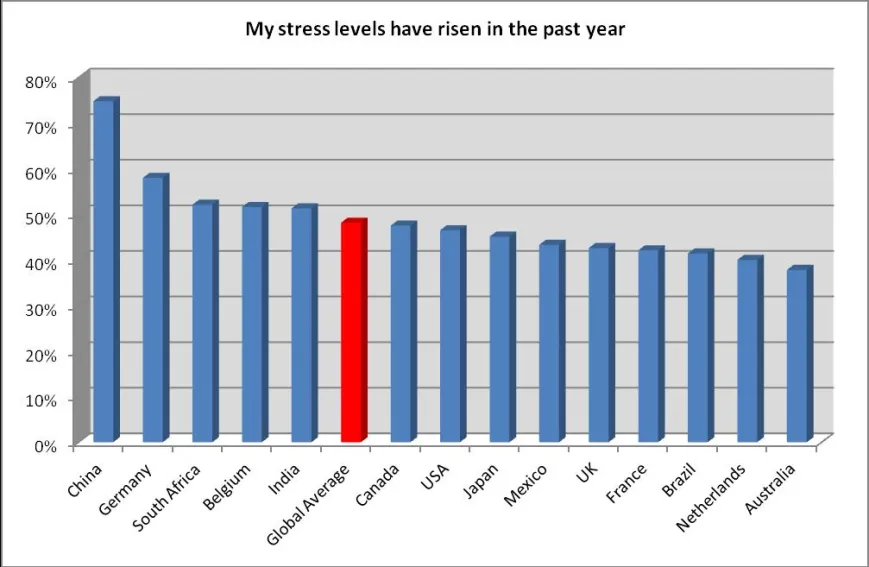
Why Hong Kong workers' stress levels are soaring
By Filippo SartiAcross the world, workers are getting more and more stressed. Instead of regaining their pre-downturn peace of mind and tranquillity, workers globally report that, two years on, their stress levels are up and rising.
How can this possibly be? And what new destabilising forces are at play to cause this increase?
The answer is complex and coloured with a host of local factors that range from Eurozone instability, to difficulties in managing the speed of change in economies where obsolete hierarchical structures frustrate youth and entrepreneurship, to the age-old struggle which sees women in emerging economies engaged in reconciling traditional housekeeping roles with the demands of the contemporary workplace.
And stress is an insidious enemy affecting sufferers with a range of problems from sleepless nights to more serious conditions such as high blood pressure, heart conditions, diabetes, asthma and skin ailments, but ultimately, stress can also affect a company's bottomline.
As stress related conditions, reportedly accounting for between 75% and 90% of doctors' visits, 1 turn into sick days or, worse, into chronic conditions, businesses are likely to see their productivity drop dramatically. In particular, businesses risk losing some of their best staff to burnout as the demands on these high achievers grow unchecked and long periods of constant stress deplete them of motivation and interest.
A number of triggers are driving up stress globally, finds the latest research by Regus surveying over 16,000 professionals across more than 80 countries, with the result that half of workers declare that they are more stressed than last year.
Any escalation in stress should be regarded as highly negative and dangerous, particularly as the global economy is indeed emerging from a difficult patch. Over the past four years many workers will have experienced forced changes in career, personal financial difficulties and second-hand stress from the tense surrounding environment.
Any more stress could be the straw that breaks the camel's back.
See Graph 1
The research reveals that, among the world's top 50 economies, China saw the biggest rise in stress levels over the past year (75%).
In Germany, too, a large proportion of respondents (58%) have experienced an increase in stress (the Hong Kong figure is only slightly lower, at 55%).
It may be that signs of a slowdown in the Chinese economy have impacted German outlook more than other countries given that Germany is the only European country with a trade surplus with China, but even at the lower end of the scale, over a third of workers in Australia and the Netherlands said they'd experienced growing stress over the past year.
In order to tackle stress at the root, the main triggers need to be identified. Interestingly, respondents revealed that two of the three main sources of stress were professional rather than personal.
These were: their job (59%) and customers (37%). Personal causes of stress were highlighted by only under a fifth of respondent with the exception of personal finances (44%).
Jobs are getting workers down in Mexico and China where over 70% of respondents reported that their job was a major stress trigger.
In Europe, French and German workers were the most likely to report that their job was a cause of anxiety, and even in Australia, where workers were less likely to blame their job for stressing them, almost half agreed.
Relationships with customers were also an important stress-trigger. It is likely that in an unstable economy currency fluctuation and late payment – reportedly representing 30% of all invoices in 2011 according to export credit insurance firm Atradius – increased tensions in customer relationships, affecting both the workers directly involved in chasing payments and managing cash-flow and others who simply perceived instability in their work environment.
Problems with customers were particularly important to workers in emerging economies where exponential growth requires rapid and continued injection of funds.
See Graph 2
But there is a light at the end of the tunnel; although the workplace is the main source of stress it is also the place where important stress-busting changes can be made. 63% of respondents report that flexible working practices are a stress-reducer, highlighting that businesses that wish to position themselves at the forefront of improving workers' lives have a simple solution readily at hand.
See Graph 3
By allowing workers the freedom to manage their own working hours or location, businesses can relieve worker stress but also take an active part in making the working environment more family friendly.
More than half of respondents (58%) confirm that flexible working is more family friendly and the benefits go hand-in-hand with stress reduction; working parents who are able to choose when and where they work can reduce the strain of reconciling work and family life, cutting stress and spending more time with their loved ones.
With two fifths of respondents reporting that flexible working is cheaper than fixed office working and the vast majority confirming that it improves productivity (77%), businesses cannot fail to take note of the win-win solution offered by flexible working; healthier more productive staff, at a lower cost.
1 https://www.slbmi.com/psychological_services/stress.html




















 Advertise
Advertise










